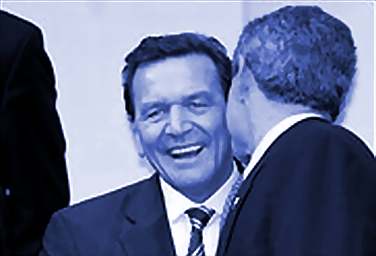This entry is about the “poisoned relations” (Condoleeza Rice, Sept 21) between the US administration and the old (and new) German government. OK, I can understand a certain confusion about the comments allegedly made by (now former) Justice Minister Herta Däubler-Gmelin (not Interior Minister, as Ms Rice indicated in the interview on Sept 21.). According to one local German newspaper she mentioned during a campaign speech addressing a union assembly in her constituency that the US administration were using the Iraq-war-issue to distract from domestic problems. This, she allegedly said, is a common tactic which had also been employed by Hitler.
No one seems to know the exact words of her statement, as it was a print journalist reporting who did apparently not use a recording device during the event. But the problem at hand is not factual accuracy.
If anybody knows about foreign policy, it is Condoleeza Rice. A lot of governments have stressed foreign policy questions during elections. It’s somewhat an executive privilege. Actually, Schroeder has done precisely that in recent weeks. In 1983, Margaret Thatcher had an entire war to distract from the economic problems her policies caused in the UK. And there can be no question about the importance of a possible war with Iraq on the current electoral agenda in the US. Last Saturday, the NY Times reported just about an inch right of the article about Ms Däubler-Gmelin’s alleged remarks that the President’s party is gaining from the “war talk” using the headline “G.O.P. Gains From War Talk. But Does Not Talk About It”. The fair question therefore seems to be not if, but to which extent the war talk is a campaigning issue.
Whatever it was Herta Däubler-Gmelin said, it was no personal comparison of Bush and Hitler. But it was most certainly an extremely stupid thing to say given the current climate. Politics is not academia. It is not about being right.
Well, the current “poisoned” climate. How did it come about? The Bush hawks say, getting rid of Saddam is not an ‘if’-question, but a question of ‘when’. Public discourse: Saddam’s Iraq is a member of the Axis of Evil, a supporter of terrorism and in possession of weapons of mass destruction (now widely known as WMD) which he is ready to use against Israel and the Western world. But the evidence provided for this claim is, until today, rather sketchy. Even Blair’s documentation, published earlier today, has apparently added only very little to the publicly available information concerning the Iraqi threat. Let’s face it, while the Iraqi dictatorship certainly poses a threat to stability in the Middle East, there is no clear-cut Saddam-induced publicly available answer explaining why war with Iraq should suddenly have become unavoidable. However, it has become the single most important issue on the global political agenda these days.
Europeans, currently very sensitive to the increasing hollowing out of political sovereignty on US-terms, have been critical of the US proposal to oust Saddam. Schroeder, fighting a campaign, opposed the US initiative fervently, in an attempt to win the support of the generally anti-war oriented German public. He said that Germany would not participate in any military action against Iraq. His statement has probably also been informed by the dismal state of the German forces. All available crisis reaction forces are already deployed on the Balcans and in Afghanistan and Kuwait (ISAF and Enduring Freedom). Besides, the US military does not seem to be in need of military aid. So it’s all about showcase support and a political coalition backing US use of force against Iraq. Schroeder said no. Some people say it is not wise to rule out military options in order to keep pressure on Iraq and I agree. In this respect the current quarrels are truly lamentable. But it is also true that the current discourse in Washington is not about building a credible threat to usher Saddam into cooperation with the UN or is it? Unfortunately, Schroeder’s current position is also somewhat incoherent, offering military support after a possible UN mandated military intervention in Iraq – but not for the mission itself. Such a policy is certainly designed to isolate Germany in the interntional community.
But that’s not what is poisoning the climate. It is rather the way in which the US administration is interpreting its leadership of the West in their “with us or without us”-way, inspired by their vision of “moral clarity”, sulking as soon as an ally has a different opinion. I hope that the recent behavior exhibited by the US administration is not what the unipolar world order will be about: That friends are entitled to their own opinion, as long as it is the same the current US administration holds. Of course, the First Amendment to the US constitution is not supposed to guarantee freedom of speech in other countries. That is quite a clear position, it is, however, not necessarily a moral one. From my perspective GW Bush’s “smoking gun” executives seem to suffer from a lack of manners, starting with public interferences into German politics by US ambassador and Friend Of GW Dan Coats, who does not speak German at all, to Donald Rumsfeld, who would not speak to German defense minister Peter Struck during this week’s Nato meeting.
I’m sorry, I don’t quite understand that behavior. And luckily, a lot of people in the US appear to not understand it either, as Maureen Dowd’s (very funny) column “No more Bratwurst” indicates. Recommended reading.


